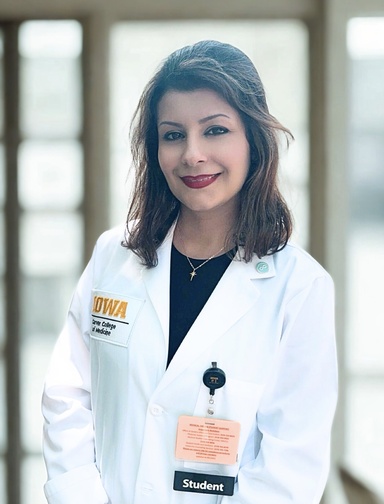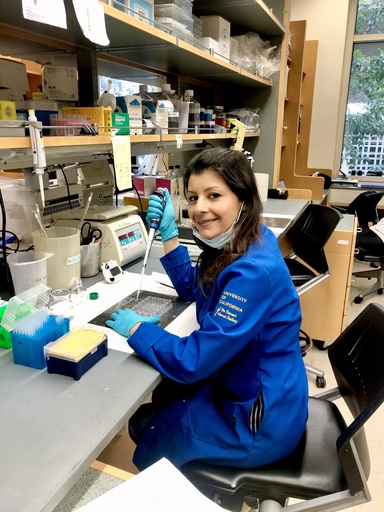Hometown: Irvine, California
Undergrad: University of California, Berkeley, neurobiology
Graduate: University of California, Los Angeles, M.S. in Physiological Sciences
First-year physician assistant (PA) student Shirin Khosravi’s White Coat Ceremony was nearly a decade in the making.
Khosravi moved to the United States from in Iran in 2009, determined to pursue an education in her new home country. She settled in southern California, where she trained to be a phlebotomist at Saddleback College in Mission Viejo. Then she worked at Mission Hospital, a Level 2 trauma center.

“It was the best five years of my life,” Khosravi says. “I gained an understanding of what a career in health care entails. I witnessed a wide variety of traumas, collaborated with a health care team, and built meaningful connections with other providers.”
Khosravi spent these five years simultaneously working on the prerequisites she would need for entrance to a four-year degree program. She earned a bachelor’s degree in neurobiology from the University of California, Berkeley in 2019. During her undergraduate studies, she got involved with research, focusing on the role of lactate in recovery after brain injury.
While at Berkeley, Khosravi participated in a unique global health service trip to Lima, Peru, through MEDLIFE (Medicine, Education, and Development for Low-Income Families Everywhere).
“I had the honor of serving underrepresented populations alongside physicians and PAs,” she says. “For the first time, I saw how poverty and health disparities affect entire communities — and how a lack of education perpetuates the cycle of inequity. I learned the importance of delivering sustainable care while respecting cultural and religious values.”
She became interested in the PA career after observing her colleagues’ passion for the profession and the emphasis on teamwork and patient-centered care.
“What attracted me most to the PA profession was the chance to work in a team-based model of care, with the flexibility to move across specialties while still forming meaningful connections with patients,” Khosravi says. “I knew I wanted to become a provider, and this path combined everything I valued in health care.”
Then, COVID-19 hit and upended her plans. Khosravi began working as a clinical research coordinator in the cancer center at University of California, Irvine, sparking a passion for evidence-based medicine. She applied and was accepted to a master’s program in physiological sciences at the University of California, Los Angeles. Her thesis explored the role of sleep disturbances caused by nighttime light pollution from electronic devices and their impact on symptoms in children with autism.
“It was a very rewarding experience,” Khosravi says. “I was able to see how scientific inquiry drives evidence-based medicine. Each step in my journey added another piece to the puzzle, and ultimately the PA profession just felt right.”
She worked as a neuroscience research associate while preparing to apply to PA school. Her research was on vestibular neuroscience topics, which involve the brain regions responsible for balance and spatial awareness.

While preparing her PA school applications, Khosravi also worked as a neuroscience research associate. Her research focused on vestibular neuroscience, which deals with the inner ear’s role in balance and spatial awareness. Her research included studying how certain drugs that treat schwannomas can disrupt synapses, leading to hearing loss and vertigo. She also examined how microgravity affects mice, producing measurable changes in balance and vestibular function.
“These projects were deeply applicable to medicine,” Khosravi says. “I really enjoyed my work as a researcher, and it helped me connect research questions directly to patient care.”
As the No. 1 PA program in the U.S., the University of Iowa Carver College of Medicine was Khosravi’s top choice.
“I loved the integration of the PA program’s courses with the medical students,” she says. “I see immense value in collaboration between physicians and PAs as early as the first semester, and that the quality of education we receive is guaranteed to be the same. I was drawn to the supportive faculty and staff, the sense of community, and the program’s national reputation.”
Khrosravi’s long road to the career of her dreams has only made her feel more ready and excited to take on the journey ahead.
“I get to be part of a solution to the problems in health care,” she says. “I hope to use my background and experiences to educate patients about their health and empower them to take part in their care.”
Looking ahead, Khosravi hopes to give back as a professor and educator in the PA profession someday, supporting and mentoring future students, especially those who are first-generation.
“I’m a first-generation student — the first in my family to earn a graduate degree and the first woman in my family to attend college,” she says. “That’s one of the things I’m most proud of. I hope I can help keep this path open for future students from similar backgrounds.”